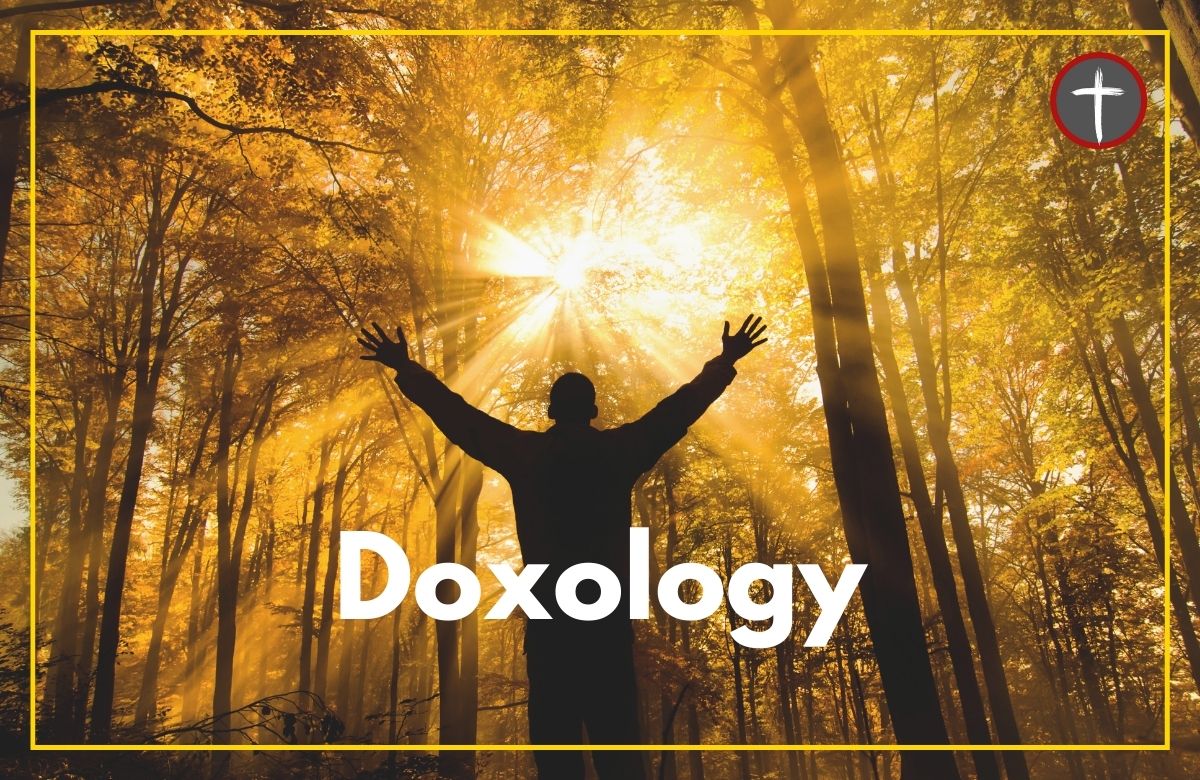Doxology
The doxology never fails to make my heart swell with praise. I feel my mind quiet, my focus sharpen, and my spirit lift toward the glory of God. For me, the simplistic, lyrical, poetic nature of the doxology encapsulates the profound beauty of worship to my God. It’s poetic words resonate deeply, elevating my voice to wonder at the majesty of Father, Son, and Spirit in harmony and I am reminded that He is the source of all things and my heart overflows.
Whether sung alone or with the harmonious combination of choir and organ, the doxology tunes my heart to God. It is a touchstone – an anchor pulling me into an attitude of gratitude and awe. What is it about these few short verses that can so powerfully draw one into transcendent worship?
I hope my words can help you to understand doxologies and how it can enrich our experience in our praise to our God.
What is a Doxology?
The word itself comes from the Greek doxa, meaning “glory” and logia means “speech” or combined “glory speech”. A doxology is, in essence, a short hymn or verse that praises God’s glory and might, which powerfully concentrates our focus towards the Divine. It is often used to punctuate – to lift our focus briefly from meditation to pure adoration.
Lifting our voices in doxology means so much more than just reciting familiar words. The doxology lifts up and magnifies the supremacy and benevolence of our Maker.
Key Elements of a Doxology
Though often compact in length, doxologies contain key elements that have made them enduringly significant. There are the three that characterize these beloved hymns of praise to God.
1. Exalts and Glorifies God Directly
The primary objective is to praise and honor the character and magnificence of God, employing a reverential approach using language directly addressed to God.
2. Succinct and Lyrical
Doxologies are generally brief, usually 4-6 lines long. It commonly possesses a poetic, rhythmic, and melodic quality.
3. A Unifying Call to Praise
Brings the body of Christ together in heart, reminding worshipers of their unified purpose in their praise to God.
The History and Origins of Doxologies
Doxologies have incredibly ancient roots in worship. Glorifying God in song at the conclusion of prayers and hymns was common practice for both Jews and early Christians. References to doxologies can be found in the Dead Sea Scrolls, making it clear just how far back this tradition extends.
There are many doxologies found in both the old and new testaments of the bible. Here is an example from 1 Chronicles of the old testament.
Praise be to you, Lord, the God of our father Israel, from everlasting to everlasting.
Yours, Lord, is the greatness and the power and the glory and the majesty and the splendor, for everything in heaven and earth is yours.
Yours, Lord, is the kingdom; you are exalted as head over all.
– 1 Chronicles 29:10-11
And from 1 Timothy in the new testament, we can find…
Now to the King eternal, immortal, invisible, the only God, be honor and glory for ever and ever. Amen. – 1 Timothy 1:17
The Doxology We Know
By far, the most familiar doxology is known as the Trinitarian Doxology, which was written by Thomas Kern, who was a Anglican Clergyman in the late 1600s.
Praise God from whom all blessings flow;
Praise Him all creatures here below;
Praise Him above, ye heav’nly host;
Praise Father, Son, and Holy Ghost.
Amen.
It’s succinct beauty expresses praise not only to God the Father, but also glorifies Jesus Christ and the Holy Spirit – illuminating the doctrine of the Trinity in a few lines.
For many believers, hearing or singing the doxology evokes an instinctive heart-swelling, a physical lifting of praise toward heaven. The soul resonates with these poetic lines in a way little else can match. Even when sung a cappella without accompaniment, the doxology carries a gravitas and beauty that transcends its simplicity.
The Theological and Unifying Nature of Doxologies
At their core, doxologies proclaim foundational theological truths about the nature of God and our relationship to Him. Their words of praise touch on the very essence of who God is – eternal, all-powerful, everlasting, and supremely worthy of worship. Though churches may differ on various doctrines, doxologies highlight core beliefs shared across denominations.
Singing or reciting these short hymns of adoration reminds diverse believers of their common ground. The doxology’s laser focus on the greatness of God and Christ rises above divisions. It’s simple refrain echoes through sanctuaries ranging from ornate cathedrals to simple storefront churches and unites young and old, new believer and seasoned saint, in common purpose and gratitude.
Despite it’s brevity, the doxology carries enormous significance. It distills volumes of theology into a few succinct lines, affirming essential truths in memorable poetic verse. And it draws Christians everywhere into unified chorus, all voices blended in loving exaltation of the Triune God.
Final Thoughts
From it’s genesis in ancient Jewish and early Christian worship to its ubiquitous presence across modern denominations, the doxology has cemented its place as a singular expression of praise to God. It’s poetic lyrics distill an awe at the glory of the Creator and gratitude for the redemptive work of the Son and the indwelling gift of the Spirit.
Though only a few lines long, the doxology carries weight – the shared hopes, prayers, and devotion of believers across centuries rise within it’s notes. The triune God is magnified by voices past and present joining together in song. There is immense significance in such a small package.
For many Christians, these short verses set to familiar melody provide a touchpoint – a way to instantly re-center one’s heart and mind on transcendent worship. The doxology grounds us in the praise of our remarkable God. When shared with other voices, it links us to the communion of saints who have gone before and who will come after. Though brief, the doxology proclaims so very much about the glory of our Creator and the wondrous nature of the Godhead. It is among the most eloquent and cherished expressions of praise in Christian life and worship.
A Doxology for My God
Blessed are You, O Lord our God, King of the universe!
You alone are worthy of all honor, glory, and praise.
Glory be to You, O God: Father, Son, and Holy Spirit.
As it was in the beginning, is now, and evermore shall be!
Amen.

